
Contents
From Wambling and Wirtching Whisky Deliver Us!
I marvel at my own supreme self-confidence!
The Public Life of Whisky Tom
Alcohol is purer but superior
Whisky or a Crown of Glory?
 ACKNOWLEDGEMENTS
ACKNOWLEDGEMENTS 
SCOTCH WHISKY is a subject which tends to bring out in writers a fey quality which they manfully repress from their other work. I am therefore indebted to the factual records of the principal archivist of the complex growth and involutions of the trade, Ross Wilson, and in particular to his books, Scotch: The Formative Years (London, Constable, 1970) and Scotch Made Easy (London, Hutchinson, 1959).
Professor David Daiches has written an extremely authoritative record which is gracefully lightened by his own unintimidated and informative personal critique on named blends and single malts: a university professor who works with seven different single malts on his desk is surely a living challenge to the old canard that entire pot-still whisky is unsuitable for people in sedentary occupations. The book is: Scotch Whisky: Its Past and Present (London, Deutsch, 1969 and Birlinn, Edinburgh, 1995).
An amateurs history, with recollections of the authors youth spent at Balmenach Distillery speckling a comprehensive survey, is: Sir Robert Bruce Lockhart, Scotch: The Whisky of Scotland in Fact and Story (London, Putnam, 1951 and 1959 and NWP, Glasgow, 1995).
I have consulted some 500 autobiographies and memoirs relating to the period, but find a lamentable lack of contemporary appreciation of the giants who were striding out of puberty at the end of the nineteenth century, and I must be restricted to the recommendation, if only for the pictures by Sidney Cowell, who was illustrating Sherlock Holmes at about that time of TR Dewars A Ramble Round the Globe with 220 illustrations (London, Chatto & Windus, 1904).
For information on the status of various Scotch whiskies in the American market, I am indebted to Max Zimmerman, of Zimmermans, 240 West Randolph Street, Chicago, friend and supplier over fifteen years to myself and Captain J Wilson Cook.
A.A.
 CHAPTER ONE
CHAPTER ONE 
From Wambling and Wirtching Whisky Deliver Us!
SCOTCH WHISKY came into the world as a lion from the north, impelled by the whip-cracks of a remarkable set of Scottish impresario ringmasters. Some of them were supremely skilful (and lucky) in mastering every facet of exploitation, including finance. Where a Barnum needed his Bailey, extroverts were supported and advised by shrewd chancellors and administrators. All of them, as the last of the merchant adventurers in individualistic capitalism, showed far more bounce and daring than is considered decent today, and went out with a grand unwhimpering bang as they handed over to Corporation Man. Such were the Whisky Barons, who flourished in the half-century stretching from the Strauss Waltz to the Charleston Age, casually taking advantage of two American disasters which marked either end of the period. The first was the American louse or aphid which brought the vine disease phylloxera to Europe, and virtually extinguished brandy production by the 1880s; the second was the American genius for masochistic misanthropy which permitted the introduction of Prohibition in the 1920s and beyond. Both scourges were highly advantageous to Scotch whisky. But battles are not won only through weakness in the enemy line; generals are needed with the wit to perceive and exploit opportunities.
This was an attribute of the only Englishman who is celebrated here Francis Berry, who in his time was neither lionised nor baronised. The rest moved up in the Honours List, rarely quitting under the rank of baronet, as witness the two (White Label) Dewars, John Baron Forteviot and Thomas Baron Dewar; James (Black and White) Buchanan, Baron Woolavington; James (Johnnie Walker) Baron Stevenson and Sir Alexander Walker, KBE; Sir Peter (White Horse) Mackie, Baronet; and Earl Haig, Viscount Dawick, Baron Haig and Laird of Bemersyde, who won his honours in World War I but used them to adorn John Haig and the Distillers Company.
By a curious irony, every one of the honours awarded to the Whisky Barons (except the Dewars first steps on the ladder and Stevensons last) was bestowed by the king on the advice of the most cunning and ferocious Prohibitionist of all. This was Prime Minister David Lloyd George, self-appointed scourge of what he called (employing his own capitals) the Drink Trade. Occasionally he varied this term of reproach to the phrase Liquor Traffic, which put it in his eyes on about the same level as the White Slave Traffic. The extraordinary feature about Lloyd Georges theatrical abhorrence of liquor was that, hating the Drink Trade as he did, he was compelled to win the war in such measure as it was won by the employment of Haig (of John Haig) as his commander-in-chief and Stevenson (of Johnnie Walker) as his backroom overlord of munitions.
The other interesting commentary is that, having put the Liquor Traffic and the White Slave Traffic on roughly the same footing, Lloyd George did not in his private life abstain from having a bit on the side, whether it was a social glass of stimulant or a white slave. But, to do him justice, he did prefer women to whisky. His appetite was, in fact, voracious, but in his conventionality he did not marry his mistress of thirty years standing until after the death of his wife. Neither wife nor mistress, however, barred him from making passes at anyone handy, as a tipsy man will slide along a bar up-ending other peoples unfinished glasses. Lloyd George took very seriously his power of patronage through the Honours List (and additionally raked in a considerable augmentation of his political funds, which perhaps promoted him into the Honours Traffic). The secretary whom he put in charge of honours applications and suggestions realized that there were other suggestions in the offing as well. She found the Prime Minister a bit amorous, which, she has since confided to the author, I didnt like at all I was very pure then. Perhaps, if Id used my loaf, Id have ended up with more than an OBE.
Before the era of the Whisky Barons, the Scots had for many centuries maintained a remarkable secrecy about their whisky, which they had been distilling from malted and unmalted barley for a thousand years as uisge beatha, one of the Gaelic names for water of life, the first word of which is now rendered as whisky. About once in every hundred years some English scholar would discover and record the wonderful properties of this rare drink, but without making a lasting impact on the south. The most fulsome in his praises was Raphael Holinshed, who in his Chronicles of England, Scotland and Ireland printed in 1577 declared that whisky, taken in moderation, cut phlegm, dispelled melancholia, cured dropsy and strangury (a condition of slow and painful urination), reduced the stone and expelled gravel, and subdued wind with its accompanying inconveniences of a wambling stomach and a twitching belly.
Holinsheds full list of the powers of whisky is worth reprinting as a public notice suitable for any bar or homoeopathic doctors waiting-room:

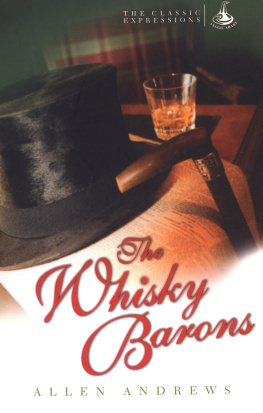
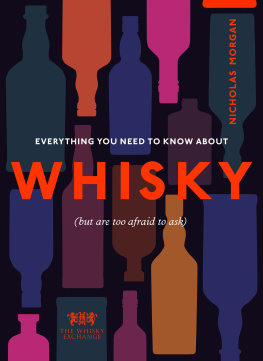
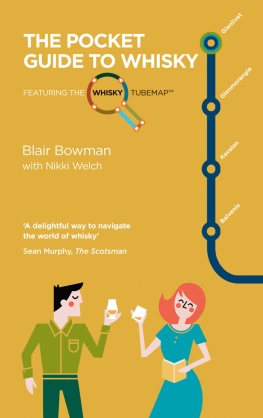
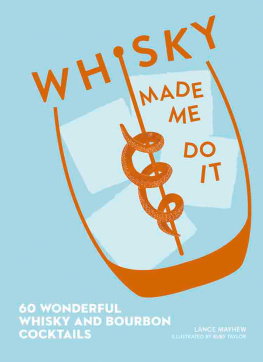

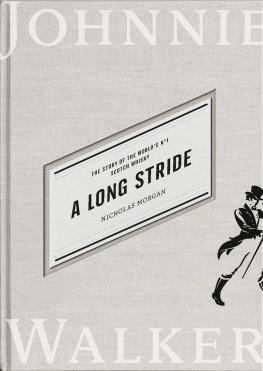
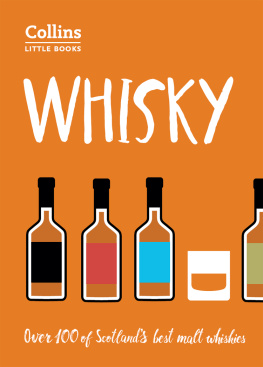
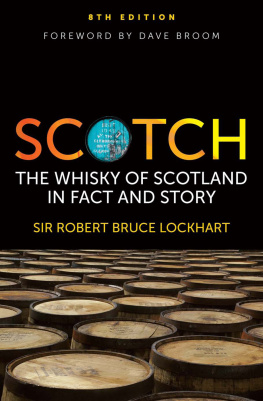
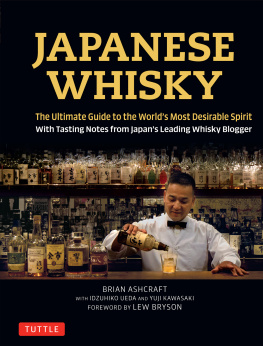
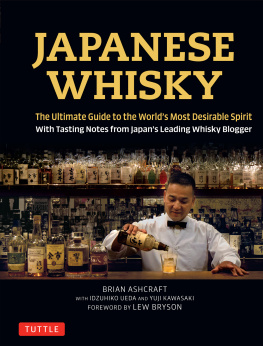
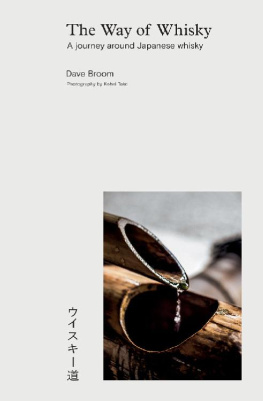
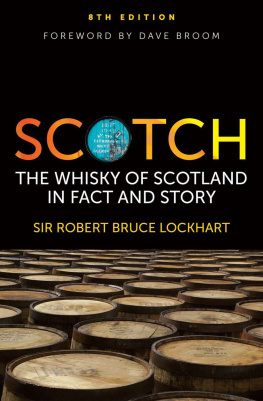


 ACKNOWLEDGEMENTS
ACKNOWLEDGEMENTS 